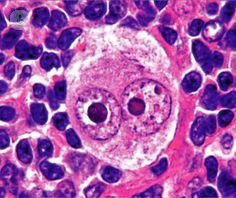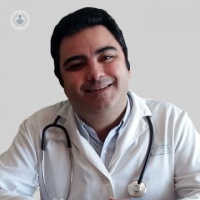What is Hodgkin's disease lymph nodes
Written by:Lymphoma affects normally lymph nodes. However, it can appear in other tissues. They can be classified in various ways. Hodgkin lymphoma or non-Hodgkin lymphoma and indolent or aggressive lymphoma, are some of them.

What is Lymphoma
Lymphoma is the "disease of the lymph nodes", ie, the system of the body that carries lymph, which contains large amounts of antibodies. It is defined as a malignant clonal proliferation of lymphocytes, which are the body's defense cells. These cells are found within lymph nodes, but can affect other tissues such as the liver, spleen, tonsils, etc.. The medium-term consequence of this disease is a malfunction of the immune system, which may be more or less severe depending on the degree of spread of the disease. Leukemic expression of this condition occurs when the disease infiltrates the bone marrow and tumor cells into the bloodstream.
Factors that can cause Lymphoma and what is their impact
Lymphoma has an incidence of 5 people per 100,000 each year. The average age at which the disease usually occurs is 60 years, with a slight predominance of males. Up to this point they are not clear what factors may trigger the disease. In some cases it is associated with infectious processes for certain types of bacteria such as Helicobacter pylori or Borrelia, or viral processes such as Epstein Baar. Experts have also associated this condition the use of certain hair dyes, ionizing radiation, insecticides and certain types of chemotherapy, without being able to objectify conclusive evidence.
Symptoms of Lymphoma
The main sign of lymphoma is the enlarged lymph nodes, which are called lymphadenopathy, sometimes accessible to exploration, such as neck, armpit or groin areas. Generally these enlarged lymph nodes are not painful on palpation. When the lymph nodes appear in less accessible to exploration, such as the abdomen or mediastinum areas can go unnoticed, so the diagnosis is more difficult, performing this when other symptoms that require deeper studies appear. Symptoms that may occur are:- Fever above 38 ° C- Profuse night sweats that soaks clothes- Unexplained weight loss, usually greater than 10% of the total body in six monthsOther less common symptoms:- Enlarged liver and spleen
Do I have a lymphoma for suffering an enlarged glands and fever?
Given the low incidence of this disease first thing to rule that there is no underlying infectious process, which usually occurs in most cases. Therefore, first of all, show calm and see a doctor to make the necessary additional tests or refer to appropriate specialists.Lymphoma Prevention: is it possible?Since little is known about the epidemiology of this process, there is, to date, no way to prevent the development of lymphoma. The experts emphasize that carry a healthy lifestyle may reduce the risk of developing this type of disease, but has not established a direct causal link. In general, experts recommend avoiding obesity, smoking and cardiovascular risk factors, not because they prevent the development of disease, but because, given the need for an intense chemotherapy or radiotherapy, the more chance you have at success reduce as much as possible the associated conmorbilidad.
Classification of Lymphomas
Traditionally, and from the histological point of view, the first classification held Lymphoma dating from the late nineteenth century. It was in Hodgkin and non-Hodgkin, depending on the presence of a type of cell that, to date, seems to belong to the family of B cell, which cell Reed-Stembert denominated in Hodgkin's lymphoma or "cell owl's eye "for the peculiar provision has twice seen the cell nucleus optical microscope. All others who did not belong to this category called non-Hodgkin lymphomas. This classification has endured over time until today.Another form of classification which dates from the mid 70's by prognosis or curability in degrees: low, intermediate or high grade. However a classification system freshest of the late 80s and is the most commonly used by specialists based on their clinical performance is called REAL classification; and divided into two main types:- Indolent lymphoma: is one that tends to grow slowly. Even without treatment, patients live for many years without any complications as a result of disease progression. For some of these patients any treatment is not recommended until the onset of symptoms.- Aggressive Lymphoma: grow faster than indolent. Without treatment, the life expectancy of these patients is weeks or months. Fortunately, most are chemo- and radiosensitive and many are cured.
Diagnosis of Lymphoma
The diagnosis of lymphoma should be systematized and structured in order to determine the histological type, and the degree of extension, as it will determine the prognosis and treatment schedule protocolized about. This will make a thorough patient history, emphasizing family, personal habits or concomitant diseases, followed by an appropriate clinical examination, detecting lymphadenopathy or organomegaly as well as the characteristics of the same background.Once this is done, proceed to the appropriate analytical and serological study of the patient by the specialist, imaging tests such as ultrasound-CT-PET, among others, and finally a study node biopsy and / or bone marrow, which will confirmatory diagnosis of pathology.
Lymphoma Treatment and Prognosis
Lymphoma Treatment is varied and simply observe the patient goes through a scheduled basis, to the application of different protocols chemo-radiotherapy treatment, including stem cell transplantation. All treatment will depend on the type of lymphoma and the extent of spread of the disease. It is therefore important to the appearance or suspicion of symptoms, see your doctor for the right approach.As for the prognosis, thanks to the medical breakthrough in treatment, today heal up to 60% of cases of lymphoma, although the outlook depends on a number of factors including age, general condition of the patient The stage of disease at diagnosis and histological type in question, as noted above.


